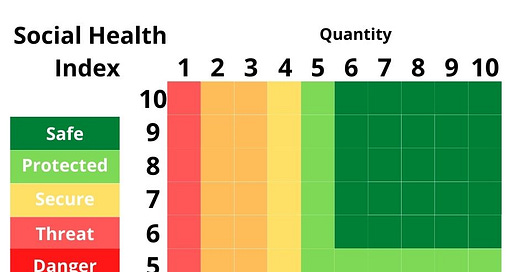How Healthy are You, Socially?
... according to Chelsea, people who are socially healthy have strong relationships and friendships that they can tap into as a support network.
Name people that will bail you out of a tough situation. Count the names and call that “QUANTITY”.
Name people that know your deepest desires and dreads. Count the names and call that “QUALITY”.
According to Chelsea Shields, that’s how you can tell how healthy you are socially!
At “founders’ health” session, we talked about “social health” and its relationship to “mental agility”.
As a reminder, mental agility is the ability to face and go through adversity without breaking down and even coming out stronger. It is the equivalent of fitness but for your psyche. Mental agility is based on “self-awareness” (to understand and acknowledge what you experience and how that feels), “emotional awareness” (to understand and regulate the emotional responses to the experience), and “situational awareness” (to understand the context in which the experience happened).
Situational awareness itself has two important components: factual curiosity, and social curiosity. Factual curiosity teaches us what was true about a situation factually and objectively. Social curiosity shows us how people involved subjectively experienced the situation.
Now, according to Chelsea, people who are socially healthy have strong relationships and friendships that they can tap into as a support network. These relationships and networks act as a buffer or a coping mechanism that would help us navigate tough, adverse situations, and could be the basis for our ongoing fulfillment and satisfaction. Social curiosity on the other hand is the most important mechanism we use to create these friendships and relationships on longer time scales, but also at the same time is a powerful rule of thumb for getting out of tough situations. Think about the last time you had an argument with someone. If instead of assuming the worst about yourself or them, you would have been curious about their point of view and their subjective experience, perhaps the outcome would have been different? Or at least, perhaps you wouldn’t have had as many sleepless nights rehashing the argument.
Some aspects of social curiosity are things like active listening, nurturing and care giving, asking for help, and negotiation and conflict resolution. In all these activities, curiosity can play a significant role in the outcome of an interaction, and I would bet would create a better foundation for a longer term relationship.
There was also another aspect that is very interesting but we didn’t explore much: the relationship between social health and attachment theory! The latter describes the patterns of behavior people use in interactions with others with “secure” being the healthiest and “avoidant” and “anxious” being the other types of attachment.
Some of the interesting questions we were left at the end with are:
a) is the social health index and the specific definition generalizable to all contexts, like professional vs personal?
b) what is the role of IRL experiences in social health? and
c) how do you make friends as adults?




